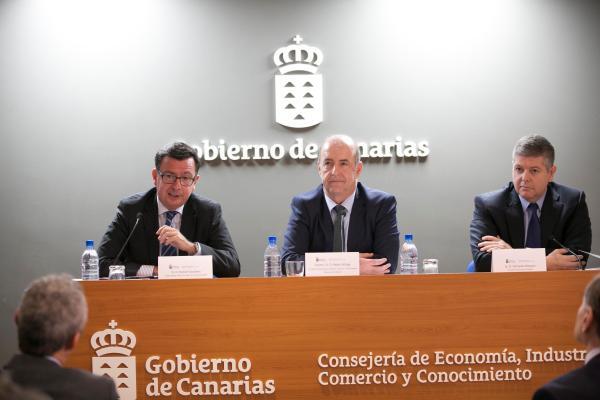
- EU bank signs EUR 125 million loan agreement with Redexis Gas under Juncker Plan
- Agreement will enable roll-out of energy infrastructure in 11 autonomous regions – including Canary Islands, which will be supplied with new propane air networks
- EIB Vice-President Román Escolano and President of Government of Canary Islands, Fernando Clavijo Batlle, meet to discuss EIB-financed projects
The European Investment Bank (EIB) is supporting the development of new gas distribution infrastructure in Spain with a EUR 125 million loan to Redexis Gas. The agreement was signed today in the Canary Islands, which will be the location of a large part of the investments financed by the loan.
The loan and investments are aimed at extending and upgrading gas distribution networks in Spain. The Redexis Gas project is supported by the European Fund for Strategic Investments (EFSI), the main plank of the European Commission's Investment Plan for Europe, also known as the Juncker Plan.
The agreement was signed today in Las Palmas de Gran Canaria by EIB Vice-President Román Escolano and the CEO of Redexis Gas, Fernando Bergasa, in the presence of Pedro Ortega, Minister of the Economy of the Canary Islands, the region in which a large part of the investments financed by these loans will be located.
The finance provided by the EIB will enable Redexis Gas to develop new distribution networks in 11 autonomous communities, including five convergence regions, with the aim of supplying gas to a greater number of citizens, businesses and industries. Specifically, Redexis Gas will extend its piped gas distribution network by 845 km, adding 115,000 new connection points. The agreement will also have a positive impact on employment: the project will require the recruitment of 2,400 people during the implementation phase.
In addition to extending the piped gas distribution network in Spain, Redexis Gas’s EIB-financed investments will serve to reduce dependence on polluting energy sources and thus cut CO2 emissions. The project financed will partly involve construction by Redexis Gas, in the period 2018-2019, of new piped gas distribution networks taking gas to eight municipalities that currently do not have access to this type of energy. To secure the supply, two islands (Tenerife and Gran Canaria) will be provided with a total of eight new propane air plants.
With the backing of the Investment Plan for Europe, this loan will help to promote projects that, owing to their structure or nature, contribute to boosting economic growth, innovation and job creation.
At the signing ceremony, EIB Vice-President Román Escolano said: “With today's agreement, the EIB is taking a further step in its efforts to ensure energy quality and security in Spain, especially the Canary Islands. Thanks to this project, thousands of homes and businesses on the islands will have a more stable energy supply adapted to their needs while at the same time progress is being made in the fight against climate change”.
The European Commissioner for Energy, Miguel Arias Cañete, added: "I am pleased to see how the EIB is continuing to support investments in energy infrastructure, the key to creating an Energy Union in Europe. Putting an end to the Iberian Peninsula’s energy isolation is one of the European Commission’s priorities, but this requires first improving interconnections within Spain. Thanks to the construction of these distribution networks, we will create a Spanish energy market that is more secure, accessible and sustainable for everybody."
Fernando Bergasa, CEO of Redexis Gas, reaffirmed the company’s interest in undertaking the necessary investment to roll out piped gas networks in the Canary Islands as efficiently and beneficially as possible for people, businesses and industries: “Redexis Gas possesses the necessary financial resources to undertake this expansion, which will introduce a key form of energy that will benefit the Canary Islands’ economy and competitiveness. The investment plan envisages the creation of 700 direct and indirect jobs on the islands for the operation, roll-out, maintenance and commercialisation of these facilities, which will provide access to 425,000 homes in eight municipalities, i.e. 85% of the inhabitants of those cities, as well as to the main industries and businesses in all sectors”.
The Minister of the Economy, Industry, Commerce and Knowledge of the Government of the Canary Islands, Pedro Ortega, said that: “The agreement bringing us together today is in tune with the steps taken by the Government of the Canaries since the beginning of this term towards building a more sustainable Canaries. We have to tackle climate change from three angles: more renewable energy (as much as possible with current technologies), less consumption and fewer atmospheric emissions”. He went on to say that “the Government of the Canaries is going to ensure that the share of renewables on our archipelago increases from 9-10% in 2015 to 20% by the end of 2018. We are therefore going to double the share of renewables on the islands. We will also be working to reduce consumption, which will result in greater energy efficiency. And at the same time we are taking steps to reduce the emission of greenhouse gases into the atmosphere - CO2, sulphur and nitrous oxide - to a minimum. Throughout the world today there is a part of energy that cannot be renewable. We therefore believe that the combination of these three approaches is the best way to combat climate change going forward”.

©EIB
Download original